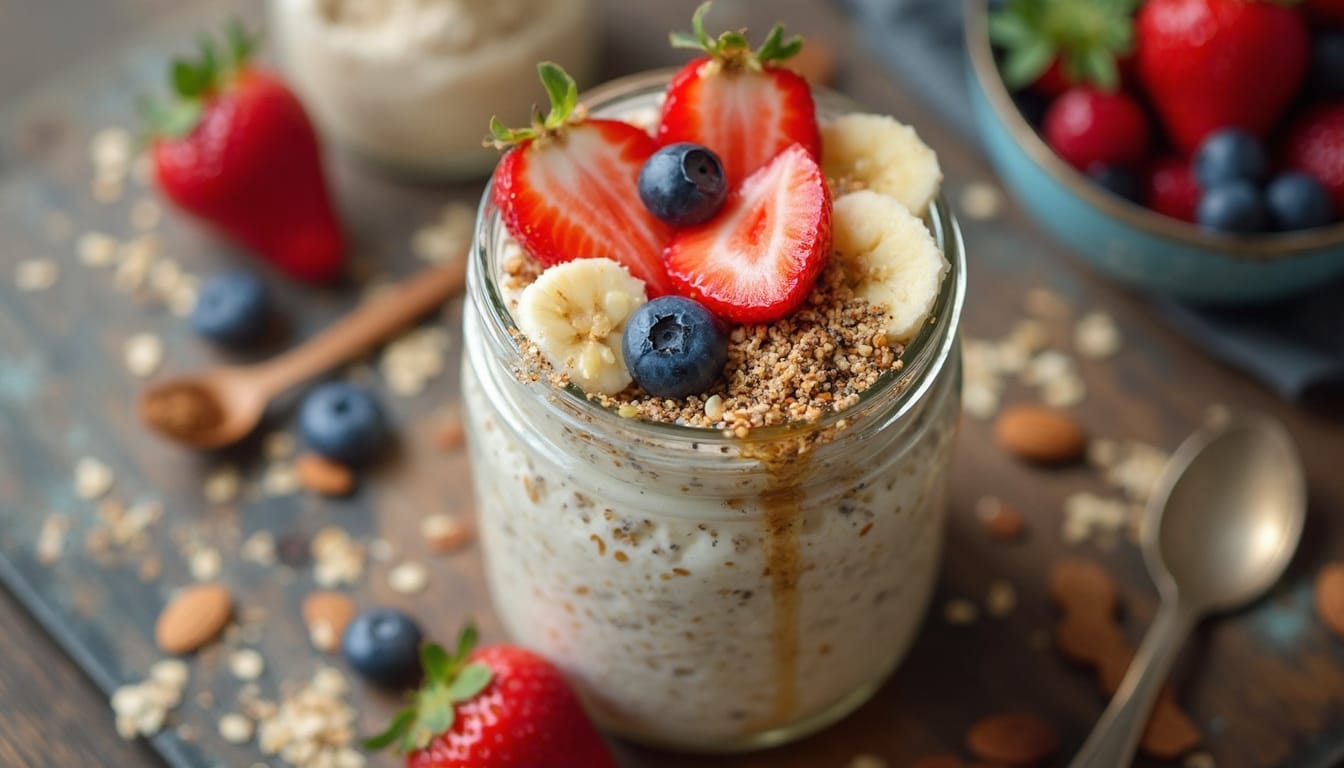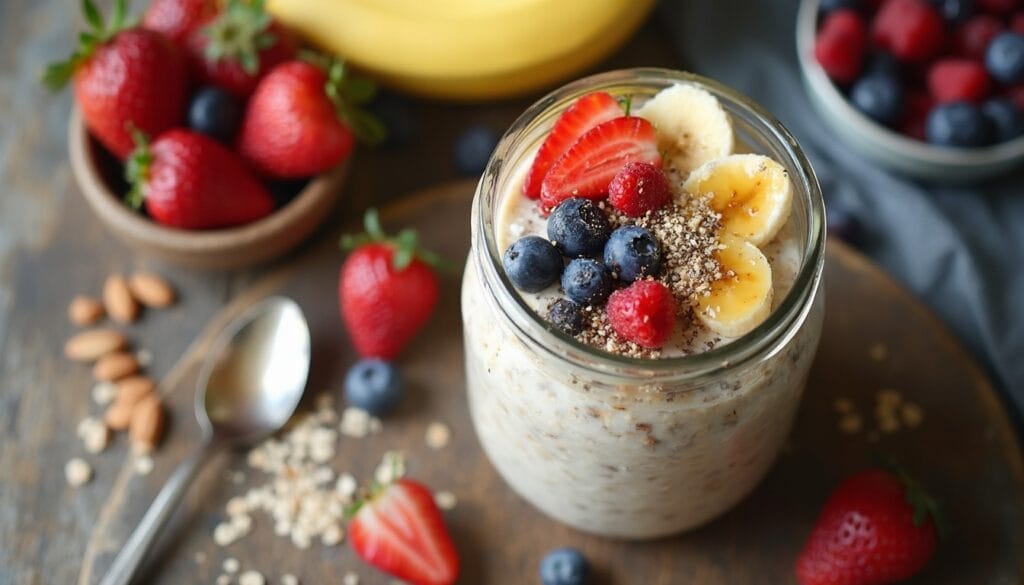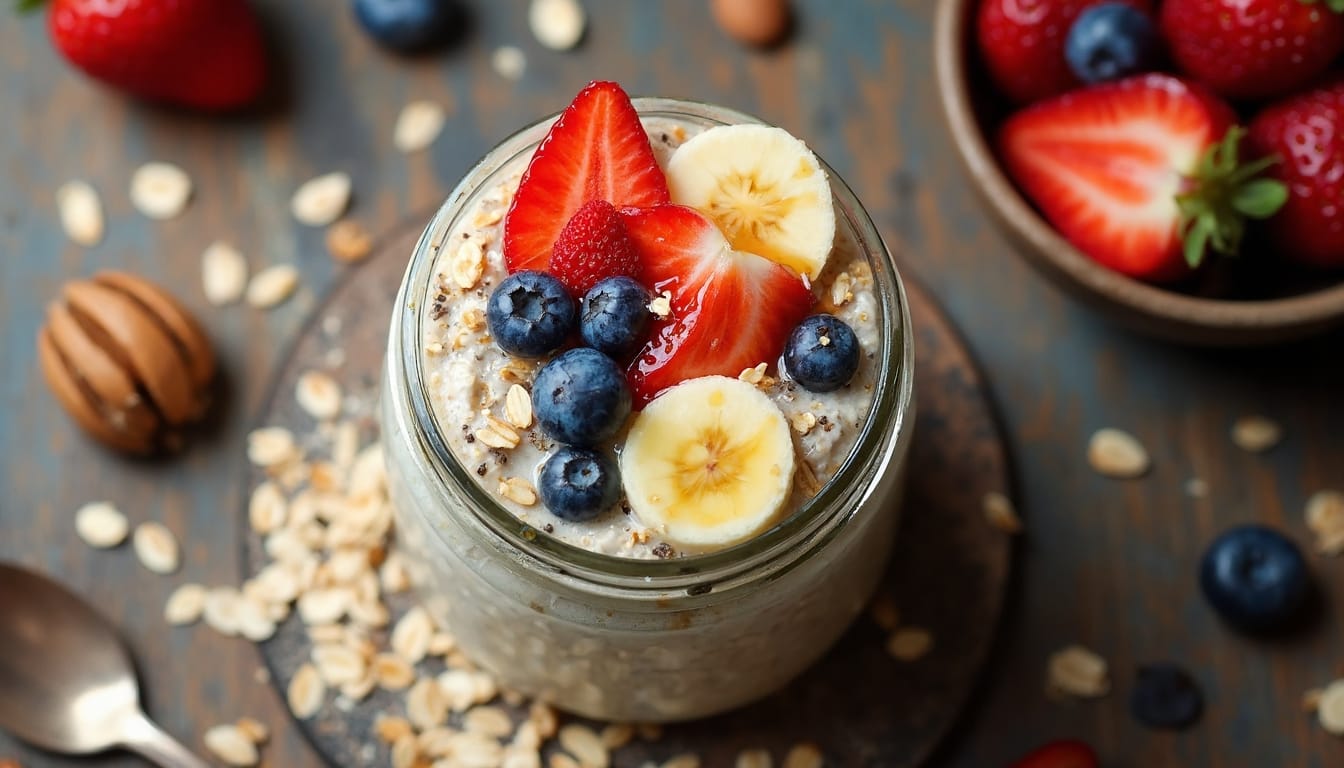Table of contents
- Introduction: The Health Debate on Overnight Oats
- What Are Overnight Oats, and Are They Healthy
- Nutritional Breakdown: Are Overnight Oats Healthy?
- Exploring the Health Benefits: Are Overnight Oats Healthy?
- Are Overnight Oats Healthier Than Other Breakfast Options?
- Are Overnight Oats Healthy or Too High in Carbs?
- Are Overnight Oats Healthy or Too High in Calories?
- Can Overnight Oats Cause Digestive Issues?
- Misconceptions About Nutritional Loss
- Choosing the Right Oats
- Selecting Healthy Liquid Bases
- Balancing Macros with Add-Ins
- Reducing Sugar Content
- Incorporating Superfoods
- Practical Tips for Customization
Introduction: The Health Debate on Overnight Oats
Are overnight oats healthy? This is a common question as they’ve become a breakfast staple for many health-conscious individuals. With promises of convenience and nutritional benefits, they’re often praised as a perfect start to the day. But are they truly as healthy as they seem? This article delves into the nutritional profile, health benefits, and potential concerns surrounding overnight oats, helping you decide if they belong in your daily routine.

What Are Overnight Oats, and Are They Healthy
How Are Overnight Oats Prepared, and Are They Healthy?
Overnight oats are a no-cook method of preparing oats. Instead of boiling, you soak rolled oats in a liquid such as milk, water, or yogurt and let them sit overnight. By morning, the oats absorb the liquid, becoming soft and ready to eat. Typically, they are served cold, though some prefer warming them briefly.
What Ingredients Make Overnight Oats Healthy?
The base ingredients for overnight oats include:
- Rolled oats (not instant or steel-cut)
- Liquid base (milk, almond milk, soy milk, or yogurt)
- Optional add-ins like:
- Sweeteners (honey, maple syrup)
- Toppings (berries, nuts, seeds)
- Flavors (vanilla, cinnamon)
The versatility of overnight oats allows you to tailor them to your taste preferences and nutritional needs. However, this flexibility can also affect their health benefits, as calorie and sugar content can quickly add up.
Nutritional Breakdown: Are Overnight Oats Healthy?
Are Overnight Oats Healthy in Terms of Carbs, Protein, and Fats?
- Carbohydrates: Oats are a rich source of complex carbohydrates. A typical serving provides slow-digesting carbs that help maintain stable energy levels throughout the day.
- Protein: Although oats are not inherently high in protein, combining them with Greek yogurt, milk, or protein powders boosts their protein content.
- Fats: Oats are low in fat, but healthy fats can be added using nuts, seeds, or coconut milk.
Vitamins and Minerals Found in Oats
Oats are packed with essential nutrients, including:
- Fiber: High in beta-glucan, which supports heart health and digestion.
- Iron: Important for oxygen transport in the blood.
- Magnesium and Potassium: Key for muscle and nerve function.
- B vitamins: Vital for energy production and metabolism.
For a more detailed nutritional breakdown, check out this nutrition analysis of oats.
Exploring the Health Benefits: Are Overnight Oats Healthy?
Are overnight oats healthy for everyone?
Role in Heart Health
One major reason people ask, ‘Are overnight oats healthy?’ is their ability to lower cholesterol levels due to beta-glucan fiber. Regular consumption may reduce LDL (“bad cholesterol”) levels, lowering the risk of cardiovascular disease. The American Heart Association recommends oats as part of a heart-healthy diet.
Benefits for Digestion and Gut Health
The high fiber content in oats aids digestion by promoting regular bowel movements and preventing constipation. Additionally, using fermented bases like yogurt introduces probiotics, which enhance gut health by supporting a balanced microbiome.
Sustained Energy Release
Overnight oats offer long-lasting energy, making them an excellent choice for breakfast. The combination of complex carbs and added proteins helps maintain stable blood sugar levels, preventing the mid-morning energy crash.
Are Overnight Oats Healthier Than Other Breakfast Options?
Are overnight oats healthy compared to hot oatmeal or quick cereal options?
Overnight Oats vs. Hot Oatmeal
Are overnight oats healthy when compared to hot oatmeal? Both options use the same base ingredient, their preparation methods influence their nutritional profile:
- Overnight oats retain more nutrients, as they aren’t exposed to high heat.
- Hot oatmeal may be easier to digest for those with sensitive stomachs.
Overnight Oats vs. Cereal and Other Quick Options
Compared to sugary cereals or processed breakfast bars, overnight oats are a much healthier choice:
- They provide more fiber and nutrients.
- They are lower in added sugars (depending on the recipe).
For tips on making healthier breakfast choices, visit this guide on balanced breakfasts.
Are Overnight Oats Healthy or Too High in Carbs?
Understanding Carbohydrate Quality
One of the most common concerns about overnight oats is their carbohydrate content. A standard serving of oats is indeed carb-rich, providing roughly 27 grams of carbohydrates per half-cup. However, not all carbs are created equal. The carbs in oats are largely composed of:
- Complex carbohydrates: These are digested slowly, providing sustained energy.
- Fiber: This promotes digestion and stabilizes blood sugar levels.
Unlike refined carbs found in white bread or sugary snacks, the carbs in oats are paired with nutritional benefits, making them a healthier choice. For individuals managing blood sugar levels, pairing oats with protein (e.g., Greek yogurt) or healthy fats (e.g., nuts) can moderate the glycemic impact.
Impact on Blood Sugar Levels
Overnight oats have a low glycemic index (GI) compared to quick oats or sugary breakfast cereals. However, toppings like honey, maple syrup, or dried fruits can spike blood sugar levels. To mitigate this:
- Opt for low-GI sweeteners like stevia.
- Balance your meal with a protein source.
- Limit high-GI ingredients like banana slices or sugary syrups.

Are Overnight Oats Healthy or Too High in Calories?
Calorie Count in Common Recipes
A basic recipe of oats, milk, and fruit contains around 250-350 calories per serving. However, many recipes can quickly exceed 500 calories due to calorie-dense add-ins like:
- Nut butters
- Sugary syrups
- Granola or chocolate chips
While these ingredients add flavor, they can inadvertently turn a healthy breakfast into a calorie-laden meal. Being mindful of portion sizes is essential, especially for those watching their calorie intake.
Adjusting Portions and Ingredients
To keep calories in check:
- Use measuring cups for oats and liquids.
- Swap calorie-dense toppings for lower-calorie options, such as fresh berries or a sprinkle of cinnamon.
- Incorporate low-fat dairy or plant-based milk alternatives.
For an in-depth calorie comparison of breakfast options, explore this calorie chart.
Can Overnight Oats Cause Digestive Issues?
Oats and Gluten Sensitivity
Though oats are naturally gluten-free, they are often processed in facilities that handle wheat, which can lead to cross-contamination. For those with celiac disease or gluten sensitivity, this can cause symptoms like bloating, gas, or discomfort. To avoid this, choose certified gluten-free oats, which are processed in dedicated facilities.
Fiber Content and Digestive Adaptation
For those wondering, ‘Are overnight oats healthy for digestion?’ the answer lies in their high fiber content, which can be beneficial but may cause bloating initially. While fiber promotes digestive health, sudden increases in fiber intake can lead to:
- Bloating
- Gas
- Stomach cramps
To avoid these issues:
- Gradually increase your fiber intake.
- Pair oats with hydrating liquids to help digestion.
- Soak the oats longer to break down some of the fibers, making them gentler on your stomach.
Misconceptions About Nutritional Loss
Are Nutrients Lost During Soaking?
A common myth is that soaking oats overnight diminishes their nutritional value. In reality, soaking can actually:
- Improve nutrient bioavailability by breaking down phytic acid, which inhibits the absorption of minerals like zinc and iron.
- Enhance digestion by pre-softening the fiber.
This means that properly soaked oats may offer more accessible nutrients compared to dry or quickly cooked oats.
Do Add-Ins Compromise Healthiness?
Another misconception is that the add-ins in overnight oats make them unhealthy. While it’s true that excessive sweeteners or processed ingredients can detract from their nutritional value, you can easily choose healthier options. Some tips include:
- Replace processed sugar with natural sweeteners like honey or stevia.
- Use whole fruits instead of flavored syrups.
- Avoid adding excessive toppings like chocolate chips or sugary granola.
By being selective with ingredients, you can ensure your overnight oats remain a nutritious meal choice.
Choosing the Right Oats
Benefits of Whole-Grain, Organic Oats
The type of oats you use plays a critical role in the nutritional value of your overnight oats. Whole-grain, organic oats are the healthiest option because they:
- Contain the bran, germ, and endosperm, providing a rich source of fiber, protein, and micronutrients.
- Are free from synthetic pesticides and fertilizers often used in conventional farming.
- Minimize exposure to glyphosate, a controversial herbicide that has been detected in some oat products.
When shopping for oats, look for labels that specify “organic” or “whole-grain” to ensure maximum health benefits. For more information on organic vs. conventional oats, visit this organic food guide.
Selecting Healthy Liquid Bases
Nutritional Comparison: Dairy vs. Plant-Based
The liquid base you choose can significantly impact the overall nutritional profile of your overnight oats. Here’s a comparison:
Dairy Milk:
- Rich in calcium, vitamin D, and protein.
- Offers about 8 grams of protein per cup, which helps build muscle and sustain energy.
Plant-Based Milks (e.g., almond, oat, soy):
- Lower in calories (almond milk) or rich in protein (soy milk).
- Often fortified with calcium and vitamin D, making them comparable to dairy milk in nutrient content.
- Lactose-free, suitable for those with lactose intolerance.
For a balance of protein and taste, soy milk or a mix of plant-based milk with yogurt is ideal. Always check for unsweetened varieties to avoid added sugars.
Balancing Macros with Add-Ins
Adding Protein Sources: Yogurt, Protein Powder
Overnight oats alone are moderate in protein, but adding complementary ingredients can transform them into a well-rounded meal:
- Greek yogurt: A great source of protein and probiotics.
- Protein powder: Ideal for athletes or those needing a protein boost; options include whey, pea, or hemp protein.
- Nut butters: Almond or peanut butter adds flavor, healthy fats, and protein.
Choosing Healthy Fats: Nuts, Seeds, Coconut
Healthy fats are essential for brain health and sustained energy. Top your oats with:
- Chia seeds: Rich in omega-3s and fiber.
- Almonds or walnuts: Provide heart-healthy fats and a satisfying crunch.
- Coconut flakes: Adds a tropical twist with medium-chain triglycerides (MCTs) for quick energy.
Reducing Sugar Content
Natural Sweeteners vs. Processed Sugars
To maintain the healthiness of overnight oats, it’s important to avoid excess sugar. Replace processed sugars with natural alternatives like:
- Honey: Offers a touch of sweetness with added antioxidants.
- Stevia: A calorie-free option for those watching sugar intake.
- Mashed banana: Adds natural sweetness and potassium.
Controlling the Use of Syrups and Sugary Toppings
Ingredients like flavored syrups, chocolate chips, or sweetened dried fruits can quickly spike the sugar content. Instead:
- Use fresh or frozen berries.
- Sprinkle a touch of cinnamon or nutmeg for natural sweetness.
- Limit toppings like granola or processed cereals.
Incorporating Superfoods
Benefits of Chia Seeds, Flaxseeds, and Spirulina
Superfoods can elevate the nutritional value of overnight oats, providing additional health benefits:
- Chia seeds: Packed with omega-3 fatty acids, fiber, and protein.
- Flaxseeds: High in lignans and alpha-linolenic acid (ALA), promoting heart health.
- Spirulina: A nutrient-dense algae, offering a boost of iron, vitamin B12, and antioxidants.
Adding just a teaspoon or two of these superfoods can make a big difference without altering the flavor significantly.
Antioxidant-Rich Additions: Berries, Cocoa Nibs
Antioxidants are essential for combating oxidative stress and reducing inflammation. Incorporate:
- Berries (blueberries, raspberries): High in vitamin C and anthocyanins.
- Cocoa nibs: A healthier alternative to chocolate chips, rich in flavonoids.
Practical Tips for Customization
- Prep in Advance: Make a week’s worth of overnight oats in mason jars to save time during busy mornings.
- Experiment with Flavors: Try combinations like apple-cinnamon, peanut butter-banana, or tropical coconut-mango.
- Portion Control: Stick to half a cup of oats and balance with other ingredients to avoid overeating.
More FAQs
- Can I eat overnight oats every day?
Yes, as long as you vary your toppings and ingredients to ensure balanced nutrition. - Can overnight oats help with weight loss?
Absolutely! They are filling and can be made low-calorie with the right portions. - Are overnight oats safe for kids?
Yes, but consider reducing fiber-heavy ingredients for young children. - Can I use steel-cut oats for overnight oats?
Steel-cut oats take longer to soften and may require more soaking time. - How long do overnight oats last?
They stay fresh for up to five days when refrigerated. - What’s the best container for overnight oats?
Mason jars with lids are perfect for storage and portability. - Can I warm up overnight oats?
Yes, simply microwave them or heat them on the stove. - Are there vegan options for overnight oats?
Use plant-based milk and yogurt for a vegan-friendly recipe. - Can I freeze overnight oats?
Yes, but it’s best to freeze without toppings and add them fresh after thawing. - What’s the ideal ratio of oats to liquid?
A 1:2 ratio of oats to liquid works best for a creamy consistency.

